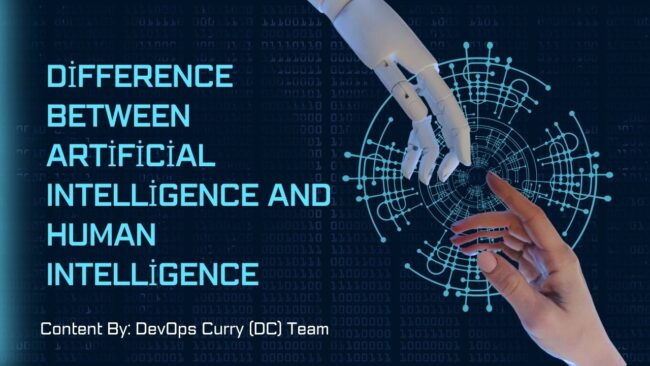AI VS Human Intelligence
In Artificial Intelligence and Human Intelligence, we have already discussed about the term AI (Artificial Intelligence) in our previous blogs https://devopscurry.com/ai-and-innovation/ https://devopscurry.com/top-10-ai-tools-of-2024/
Here we will see what is the difference between Human intelligence and Artificial Intelligence and what is the main reason the AI boom in the market. So first we will talk about Artificial Intelligence
Artificial Intelligence VS Human Intelligence
♦ Artificial Intelligence
Artificial Intelligence, created by humans, encompasses machines or software designed to replicate cognitive abilities akin to human minds. These include learning from data, solving complex problems, and making decisions efficiently and accurately. Despite its prowess in processing large datasets and recognizing patterns, AI operates without consciousness or human-like comprehension. It learns through algorithms and statistical models, progressively enhancing its performance through iterative feedback loops driven by data. However, current AI systems often lack common sense, contextual understanding, creative problem-solving capabilities, and emotional intelligence. They can also manifest biases embedded within their training data. Ethical concerns arise regarding job displacement, privacy infringement, biases in decision-making algorithms, and the broader implications of autonomous AI systems.
♦ Human Intelligence
Human intelligence is central to our abilities, encompassing a wide range of cognitive skills like reasoning, creativity, emotional understanding, and self-awareness. We humans are known for our adaptability, empathy, intuition, and our knack for learning from diverse life experiences. Our intelligence enables us to think creatively, solve abstract problems, and adjust to new and challenging situations. Learning for us involves taking in information through our senses, interacting with others, formal education, and reflecting on our personal experiences. However, we’re not without our flaws—we’re prone to biases, easily distracted, and limited by our physical capabilities. Our decisions are often shaped by emotions and our own interpretations of situations. Furthermore, ethical considerations are integral to human intelligence, touching on issues of rights, justice, and the broader impacts of our actions on society and the environment.
Some Ways To identify AI and Human Intelligence Differ
Difference Between AI and Human Intelligence
Conclusion

